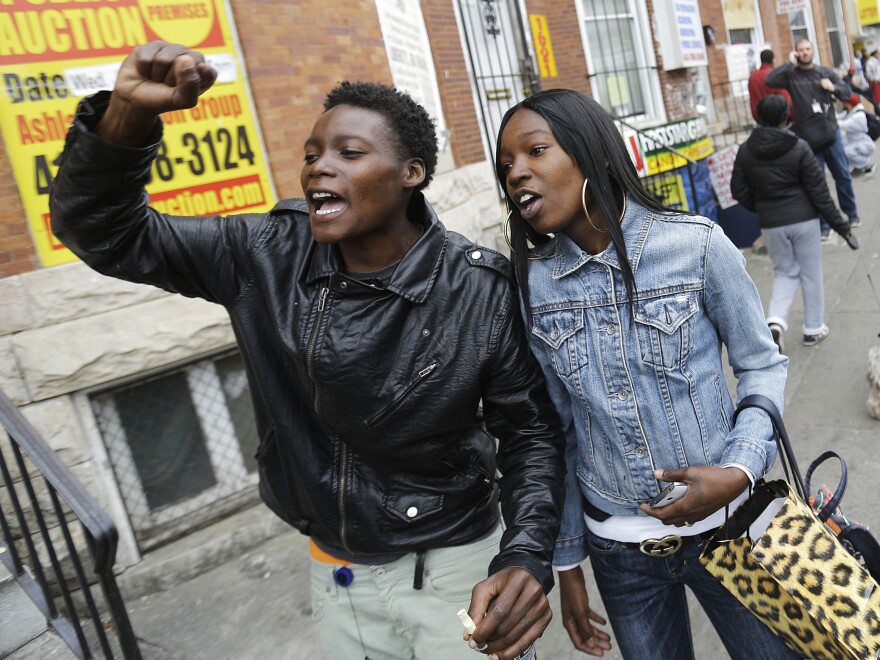It was a few days after the funeral for Freddie Gray, and the Baltimore streets that had exploded into violence this week had mostly calmed down.
But Lester Davis, a top aide to a Baltimore councilmember, told me that there were real, lingering concerns among the city's elected officials and community leaders about what might pop off at week's end, when the police department was set to hand over findings from its investigation into the murky circumstances surrounding Gray's death. Gray died after he was arrested by local police officers, with an array of severe injuries, including a severed spine, that were hard to explain. Officials had met with top police brass to discuss the heightened anxieties around what might happen on Friday, when the state's attorney, Marilyn Mosby, was expected to address the report.

Davis and his boss, Jack Young, had been going out into the streets each night, calling for peace but also trying to manage folks' expectations and dampen any potential disappointment. Charges against the officers in the case might be a long way away, Davis figured, if they came at all — a litany of similar, high-profile cases never resulted in criminal charges against the police officers involved. "I have no idea how much of [the report] is actually going to be made public," Davis said with concern.
That's why what happened Friday seemed to take almost everyone by surprise: in a live, televised press conference, Mosby, just a few months into the job, announced a constellation of criminal charges, including murder and manslaughter, against six officers involved in the Freddie Gray case. For nearly 16 minutes, she rattled off a timeline of the incident as determined by the police and an independent inquiry carried out by her own office. She said arrest warrants had been issued for the officers. There were cheers from some in the stunned crowd.
Then, for good measure, she tried to bridge some divides.
"To the people of Baltimore and the demonstrators across America: I heard your call for 'No justice, no peace,'" Mosby said. "Your peace is sincerely needed as I work to deliver justice on behalf of this young man."
She reached out to the police force, and said the charges against the six officers were "not an indictment of the entire force."
"I come from five generations of law enforcement. My father was an officer, my mother was an officer, several of my aunts and uncles, my recently departed and beloved grandfather was one of the founding members of the first black police organization in Massachusetts. I can tell you that the actions of these officers will not and should not, in any way, damage the important working relationships between police and prosecutors as we continue to fight together to reduce crime in Baltimore. Thank you for your courage, committee and sacrifice for the betterment of the community."
Then she nodded to the young people in her town who had been the source of so much worry in recent days.
"Last but certainly not least, to the youth of the city. I will seek justice on your behalf. This is a moment. This is your moment. Let's insure we have peaceful and productive rallies that will develop structural and systemic changes for generations to come. You're at the forefront of this cause and as young people, our time is now."
When I talked to Davis after the press conference, he said that folks in City Hall were "shocked."
"I don't think any of us expected this," he said, referring to the charges against the officers. "All of the chatter and all the official talk had been geared to what happened today wasn't going to happen."
Meanwhile, social media — hell, regular, old media – exploded. Just who was this lady? By mid-afternoon, theNew York Times had run a profile on her, while the Wall Street Journal pulled together a fact sheet. ("She gave a broken city hope through justice like Missouri State Highway Patrol Capt. Ron Johnson did when he arrived in Ferguson," Linda Stasi wrote in the New York Post. "And her mere presence had that same calming influence.")
She had about 10,000 followers on Twitter in the hour after the speech; a few hours later, that number had more than doubled. On some parts of the Twitterverse, it felt a little like Mosby has supplanted Thurgood Marshall or Claire Huxtable as the most beloved black attorney in American history.
I was surprised by Mosby's performance, too; I watched a little of her public speaking from her swearing-in ceremony in January while I was researching her husband, Nick, a city councilmember who made some news of his own in Baltimore this week. In that earlier video she seemed, well, green. And she is — her opponent in her race last year for the state's attorney post kept hammering on her inexperience; when she won the job, she became the youngest top prosecutor for any major American city.
It didn't matter. On Friday, in her first, unlikely moment in the national spotlight, Mosby seemed in complete control.
Davis, the legislative aide, lobbed an unsolicited accolade."I don't think you can get anywhere higher than Marilyn in certain communities [in Baltimore right now]," Davis said. "They'd probably parade her through the streets."
Copyright 2021 NPR. To see more, visit https://www.npr.org. 9(MDAxODg3MTg0MDEyMTg2NTY3OTI5YTI3ZA004))







